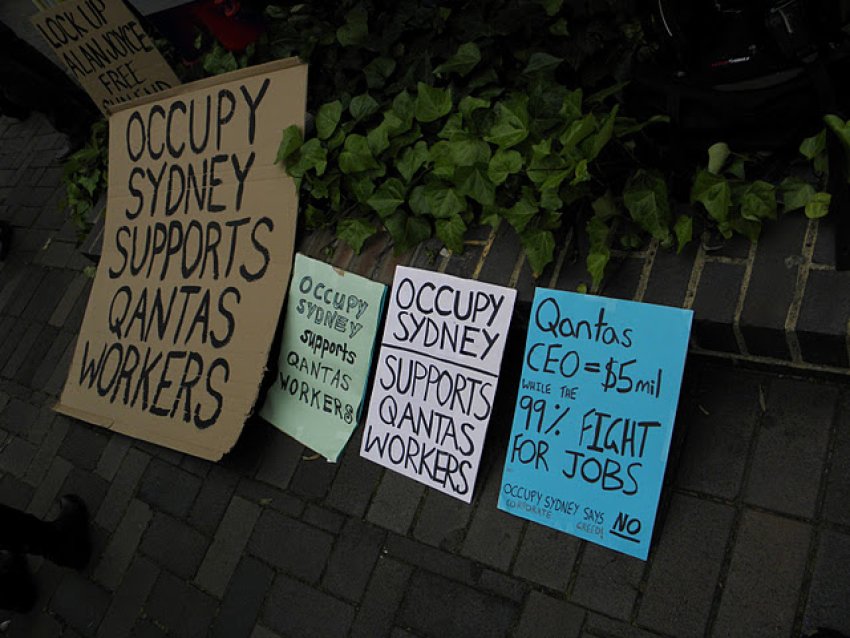
“I don't understand what the Occupy protests are all about,” is one common complaint in response to the global movement against corporate power.
An Australian-specific variation goes: “I can see the point in the US or Europe, but what is there to protest against here?”
A clear answer to these questions came on October 29 with possibly the biggest act of corporate bastardry in Australia since the stevedoring company Patricks sacked its entire unionised workforce in a bid to smash the Maritime Union of Australia in 1998.
Qantas CEO Alan Joyce announced that, in response to legally protected industrial action by some of the Qantas workforce for modest pay rises and job security, the airline was grounding its fleet and locking out its workers.
The day before, a conference of Qantas shareholders voted to give Joyce a 71% pay rise — taking his annual salary to more than $5 million. Other board members received hefty boosts to their bloated salaries too.
The hypocrisy could not have been clearer.
Joyce defended the moves, which caused chaos for thousands of people around the world booked to fly Qantas, by claiming he had no choice in the face of “extreme” demands from three unions representing Qantas workers — the Australian and International Pilots Association (AIPA), the Transport Workers Union (TWU) and the Australian Licensed Aircraft Engineers Association (ALAEA).
Joyce claimed union demands threatened thousands of jobs and the airline could go bankrupt.
However, TWU lead negotiator Scott Connolly said on October 12 that Qantas made $531 million pre-tax profit last year. Despite this, Qantas announced the sacking of 1000 workers.
The unions have spent months trying to negotiate agreements. The TWU is seeking a 5% wage and allowance rise a year, better job security for casual, labour-hire and contract staff, and protection from outsourcing.
ALAEA wants a 3% pay rise a year for three years and better job security provisions. AIPA wants to guarantee Qantas flights are piloted by Qantas pilots or by pilots on conditions equal to the Qantas pilot agreement — to stop Qantas outsourcing pilot work to cheaper labour.
Joyce's actions are aimed at destroying the power of the unions that represent Qantas workers to force through changes that will affect workers' conditions and passenger safety.
The federal Labor government immediately intervened and applied to its Fair Work Australia industrial relations commission to “resolve” the dispute by legally forcing an end to industrial action.
At 2.08am on October 31, the FWA handed down a ruling "terminating" the dispute -- a victory for Joyce and his tactics of industrial terrorism.
A better form of government intervention would be to reverse the privatisation of Qantas — and renationalise the airline.
This dispute shows why the airline should be publicly owned and run in the interests of society, not profit.
The Qantas dispute is a threat to the entire union movement and society as a whole.
If Qantas succeeds in destroying the power of its workers to collectively bargain, it will be a green light to other corporations to slash jobs, employ more contract labour, deny workers better wages and conditions, and block unions from organising.
Greens Senator Lee Rhiannon summed it up when she tweeted just after Joyce's announcement: “Alan Joyce shows he's part of 1%. #Qantas lockout another reminder why we need #Occupy movement.”
The Occupy movement is about the 99% taking on the 1% — the rich, corporate elite that dominate the economy and politics. It must actively support the struggle of the Qantas workers.
This has already begun. ALAEA general manager Peter Somerville spoke to an October 22 Occupy Sydney rally about the struggle. Occupy Sydney passed a motion in support of the Qantas workers and held a protest outside the Qantas shareholders conference.
The Qantas bosses are part of the 1%. The Qantas workers are part of the 99%. The 99% must stand with the Qantas workers.
Comments
Anonymous replied on Permalink
Anonymous replied on Permalink
Anonymous replied on Permalink
stuartmunckton@... replied on Permalink
Anonymous replied on Permalink
Anonymous replied on Permalink
Anonymous replied on Permalink
stuartmunckton@... replied on Permalink
stuartmunckton@... replied on Permalink
Anonymous replied on Permalink
stuartmunckton@... replied on Permalink
Anonymous replied on Permalink
Anonymous replied on Permalink